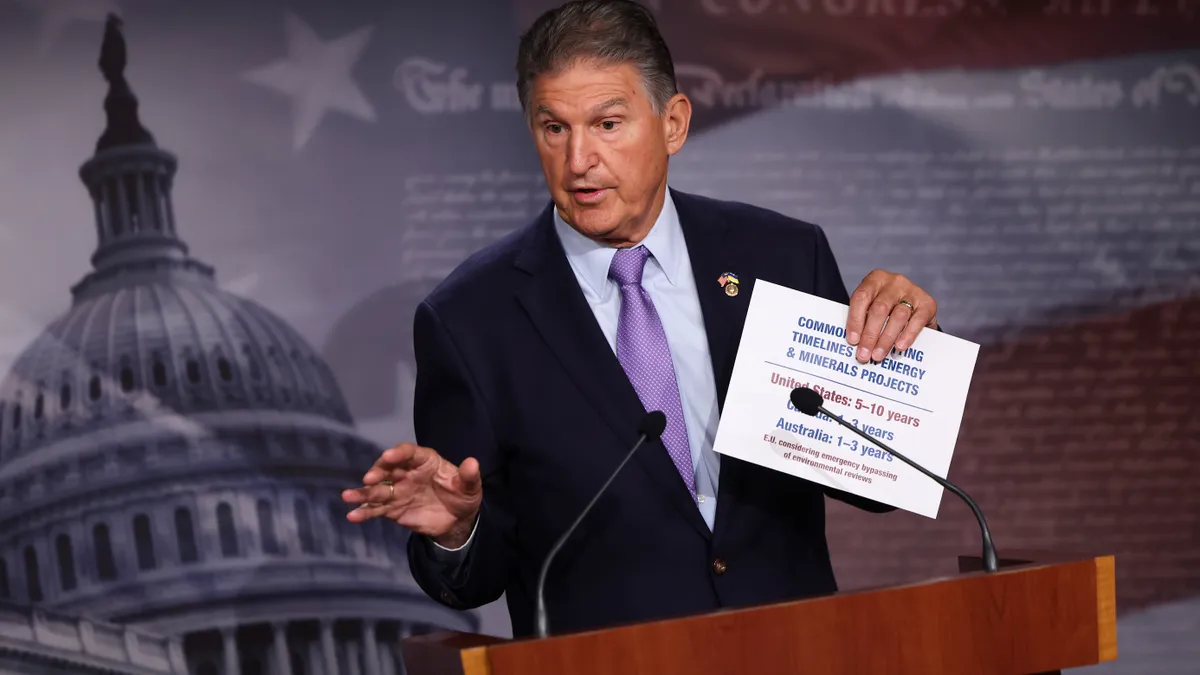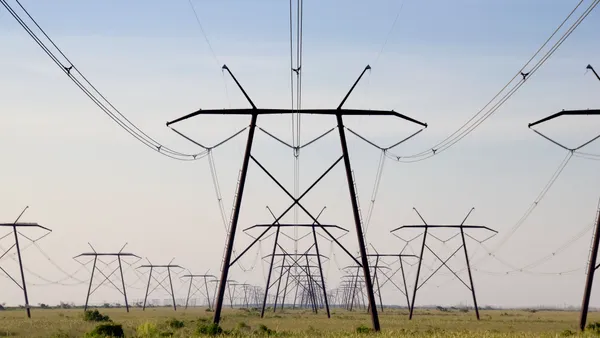Dive Brief:
- Congress should pass bipartisan permitting reform legislation introduced by Sen. Joe Manchin, D-W.Va., to accelerate deployment of critical electric transmission and speed the interconnection of clean energy resources, a Biden administration official said Wednesday.
- “The president doesn’t love everything in the bill, but we support it,” White House senior clean energy advisor John Podesta said in remarks to the Bipartisan Policy Center. The Building American Energy Security Act of 2023 is similar to a measure Manchin introduced last year but failed to advance.
- The White House laid out its priorities for permitting reform, including modernizing mining laws to aid development of critical materials, deploying hydrogen and carbon dioxide infrastructure such as pipelines and storage, and siting clean energy facilities on formerly contaminated sites.
Dive Insight:
Manchin’s previous permitting reform bill failed on a tie vote in the Senate in December but a broad range of groups hopes for a different outcome this time around.
Manchin’s new bill was introduced May 2. “There is overwhelming bipartisan recognition that our current permitting processes aren’t working and equally bipartisan support for addressing it through comprehensive permitting reform legislation,” he said in a statement.
Clean energy advocates say changes to the siting process are needed, in particular to give the Federal Energy Regulatory Commission more authority to site transmission lines to access renewables. But they also worry about a deal’s potential to support dirtier resources.
“Any compromise that would fast track fossil fuel projects or erode bedrock environmental protections like the National Environmental Policy Act or the Clean Water Act is a non-starter – period,” Sierra Club Executive Director Ben Jealous said in a statement.
Manchin’s bill would authorize completion of the Mountain Valley pipeline, a West Virginia gas project that is more than 90% built, overriding criticism from environmentalists. The legislation would also set maximum timelines for permitting reviews, including two years for NEPA reviews for major projects, and “streamlines” FERC’s authority to approve transmission lines found to be in the national interest.
The Department of Energy on Tuesday released a proposed framework for designating National Interest Electric Transmission Corridors for specific transmission projects.
The American Petroleum Institute, American Gas Association and other fossil groups in a May 1 letter to Manchin and other lawmakers called for bipartisan permitting reforms.
“It will take compromise by everybody to get this done,” Podesta said, laying out President Joe Biden’s clean energy priorities.
As a result of incentives in the Inflation Reduction Act, which Biden signed in 2022, the White House expects clean energy deployment over the next four years will be 25% higher than it would have been without the IRA.
But permitting is “one big hurdle — and a big opportunity,” Podesta added. “Right now, the permitting process for clean energy infrastructure, including transmission, is plagued by delays and bottlenecks.” He said those delays are “pervasive at every level of government — federal, state and local.”
“The president supported Sen. Manchin’s permitting legislation in December, and he continues to support the same bill the senator re-introduced last week,” Podesta said. “Congress should treat that bill — and particularly the deadlines it imposes for environmental reviews — to start serious bipartisan negotiations.”
Podesta also announced seven agencies, the Federal Permitting Improvement Steering Council and the White House have signed a memorandum of understanding to accelerate electric transmission permitting.
The MOU will direct federal agencies to conduct permit decisions and environmental reviews for transmission lines “within two years and allow applicants to petition the president directly to issue any permit, certification, or opinion if a permitting schedule milestone is missed or if an authorization is denied,” according to a White House fact sheet.
The agreement was celebrated by clean energy groups.
The MOU “clearly gives the Department of Energy the power to require robust community outreach and coordination among agencies, which will make transmission permitting more efficient,” Christina Hayes, executive director of Americans for a Clean Energy Grid, said in a statement. “Still, opportunities for further improvement remain,” she added.
The agreement should also include the Department of Transportation, authorizing it to site transmission lines in existing highway rights-of-way, Hayes said.
The agreement will unlock financing and regulatory tools, improve coordination among federal agencies and transmission developers, establish milestones and deadlines for decisions and provide for consultation with communities and key constituents, said Gregory Wetstone, president and CEO of the American Council on Renewable Energy.













